The International Conference of Friendship Cities between Timor-Leste and Australia is taking place in the Noble Hall of the Ministry of Foreign Affairs and Cooperation in Dili on July 10th and 11th, bringing together municipal authorities, representatives of administrative posts, civil society members, and friendship groups from both nations. The opening ceremony was attended by the President of the Republic, José Ramos-Horta, featured a video message from Prime Minister Kay Rala Xanana Gusmão, and included speeches by the Minister of State Administration, Tomás do Rosário Cabral, and the Australian Ambassador, Caitlin Wilson. 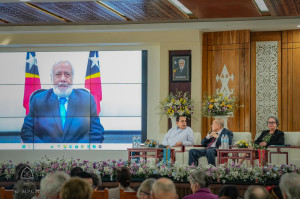
Sponsored by the Ministry of State Administration and the Timor-Leste–Australia Friendship Groups Network, the conference seeks to strengthen connections between Timorese and Australian communities, foster new partnerships at the local level, and help deepen the relations between the two countries’ governments. 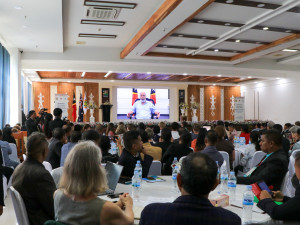
In his speech, Prime Minister Kay Rala Xanana Gusmão emphasised the importance of the friendly relations established 25 years ago, even before the country regained independence: “I remember how, in 2000, three Friendship Groups were initiated by local councils in Victoria – Friends of Baucau, Friends of Aileu and Friends of Suai/Covalima. Today, there are 32 Friendship Groups across Australia”. The Head of Government also highlighted the positive impact of these initiatives, mentioning tangible actions such as the construction of schools, the distribution of drinking water, scholarships, and technical support in healthcare. “When tensions sometimes arose in relations with the Australian Government, there was never any doubt that the Australian people supported us. Thank you for your time, your commitment, and care. Congratulations on 25 years of friendship and extraordinary achievements,” he said. 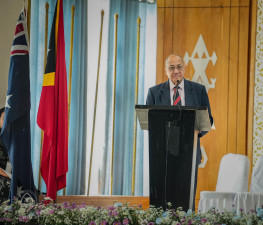
The second day of the conference opened with a personal testimony from the Minister of the Presidency of the Council of Ministers, Agio Pereira, about the long-standing relationship between Timor-Leste and Australia. He recalled nearly two decades he spent in that country. “It is with honour and sincere satisfaction that I share this personal testimony about the friendship between Timor-Leste and Australia – a friendship rooted in geography, history, and solidarity between our peoples”, he said. 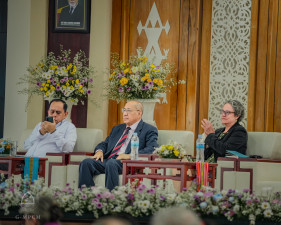
He recalled that ties between the two countries date back to World War II, when “Australian soldiers found support, protection, and companionship among the Timorese people” emphasizing that this shared history marks “the start of a unique relationship – one that was not based on strategic interests, but on acts of courage, solidarity, and humanity from both sides”.
The Minister also highlighted the 50 years of the Timorese diaspora in Australia, with “stories of resilience, integration, and active contribution to Australian society, all while maintaining a strong link to their homeland”, and praised the mobilization of Australian civil society, which “joined the cause of our liberation with generosity, courage, and conviction.” 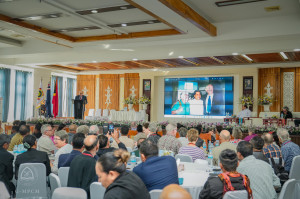
He also referred to the INTERFET mission, led by Australia in 1999, as “a powerful display of international solidarity and dedication to human rights, justice, and the dignity of peoples”, stressing that the arrival of this multinational force marked “the rebirth of hope”. 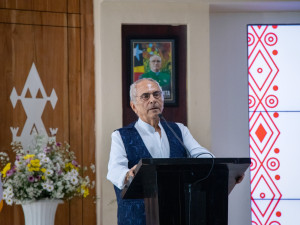
In his speech, Agio Pereira also highlighted the various dimensions of current bilateral cooperation. “Today, the relationship between Timor-Leste and Australia is that of two sovereign states, neighbours, and partners, united by common interests and a commitment to cooperation,” he said, referring to Australia’s support during the COVID-19 pandemic, as well as Timor-Leste’s accession to ASEAN and the World Trade Organisation.
He also highlighted the importance of the signing, on March 6, 2018, of the Maritime Boundary Treaty, “one of the most significant milestones in our bilateral relations” which he had “the honour of signing on behalf of our country”. This treaty, he stressed, “definitively established a fair border between our two nations, based on international law – an inspiring example to the world of peaceful dispute resolution” and represented “a genuine new beginning.” 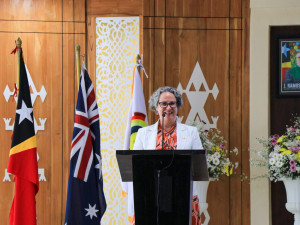
Lastly, he emphasised the essential role of Friendship Groups as platforms for direct connection between communities, stressing that “this conference is more than just a symbolic event. It is a celebration of the historic ties that connect us, an affirmation of our shared present, and an investment in the future we aim to build together.” He closed with a message of hope: “May this friendship, born in adversity, strengthened by solidarity, and renewed through cooperation between communities, continue to serve as a bridge connecting our peoples – a bridge of understanding, progress, and hope – and an inspiration to the world.” 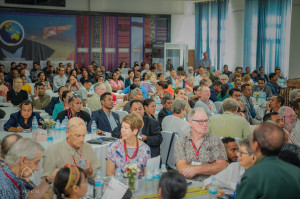
Over the two days, participants will exchange experiences and best practices through presentation sessions, video screenings, and discussion groups, aiming to develop a strategic action plan for the coming decade. The programme also features an exhibition of photographs, videos, brochures, and handicrafts related to the friendship groups’ projects, alongside a cultural evening with performances by representatives from Timorese municipalities and the diaspora. 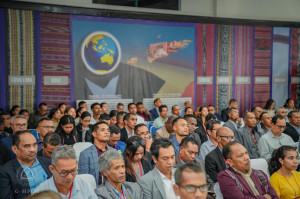
More than thirty Australian Friendship Groups are represented, including Friends of Aileu, Friends of Baguia, Friends of Baucau, Friends of Ermera, Friends of Suai/Covalima, Friends of Lacluta, Friends of Lolotoe, Friends of Maliana, Friends of Venilale, Friends of Vemasse, Friends of Lospalos, Geelong-Viqueque Friendship Schools, Blue Mountains Hatobuilico Friendship Committee, Canberra Friends of Dili, Ballarat Friends of Ainaro, Bendigo-Maubisse Friendship Committee, among others.
The Timor-Leste–Australia Friendship Cities Conference marks an important milestone in strengthening community-focused relations that, over the past 25 years, have fostered solidarity and collaborative development between the two nations.